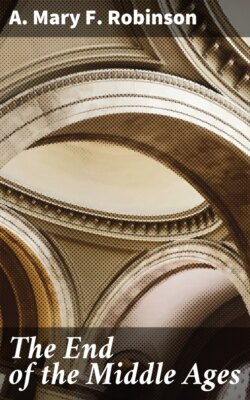Читать книгу The End of the Middle Ages - A. Mary F. Robinson - Страница 29
На сайте Литреса книга снята с продажи.
V.
ОглавлениеTable of Contents
That a great many people everywhere at one time ardently desire one thing is certainly no proof that their desire shall be satisfied; but it shows a real want in the heart of man—a want which may be stopped by altered conditions, if not by the actual things desired. As many people longed for extinction in the harassed Middle Ages as pine for immortality to-day. I do not mean to say they formulated this desire, for most of them were fervent Christians. But life was bitter then, and they hoped to extinguish their weary and craving souls in the unconscious Godhead. When life is bitter now, we say “Eternal Justice owes us a happier experience to discharge our sufferings here.” But in both attitudes the same one fact remains, that so long as life is bitter, men will crave and will complain. No modern preacher has spoken more fervently of the joys of immortality than these medieval Mystics spoke of the Abyss. Each to each has been the final and immeasurable recompense for all the wrongs that ever there were in the world. By many ardent Churchmen, and many saints, and many thinkers in the Middle Ages, God was chiefly worshipped as the Abyss. He was the Supreme Annihilation. The soul must plunge, says Eckhart, into pure Nothingness. The soul must sink, says Tauler, in the Divine Darkness, into the secret place of the Divine Abyss. “There is no safety,” says Guillame Briçonnet, “save in the Abyss” (“l’abysme qui abysme en désabysmant”). Adventitious reward, says Suso, may come in the consciousness of having conquered evil and done good; but true reward, essential reward, is only in the wild waste and deep abyss of inscrutable Deity, in the union of the soul with sheer impersonal Godhead. This Godhead, says Eckhart, is a simple stillness without quality or distinction. God is neither this nor that. Who can distinguish and say, “This is good, sees not God; for all that is in the Godhead is absolutely one, and formless, and void, and interminable, and passive.” And the names under which God is chiefly worshipped show this strange impersonal attitude. The Divine Dark, the Obscure Night, the Desert, the Abyss, the Unimaged Nakedness, the Infinite Essence, the Hidden Darkness, the One, the Supreme Nothing: these are the names of this remote, abstract Jehovah of the mediæval Mystics.
